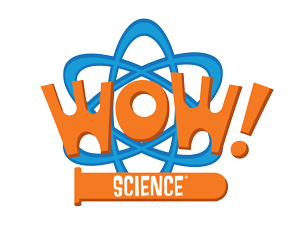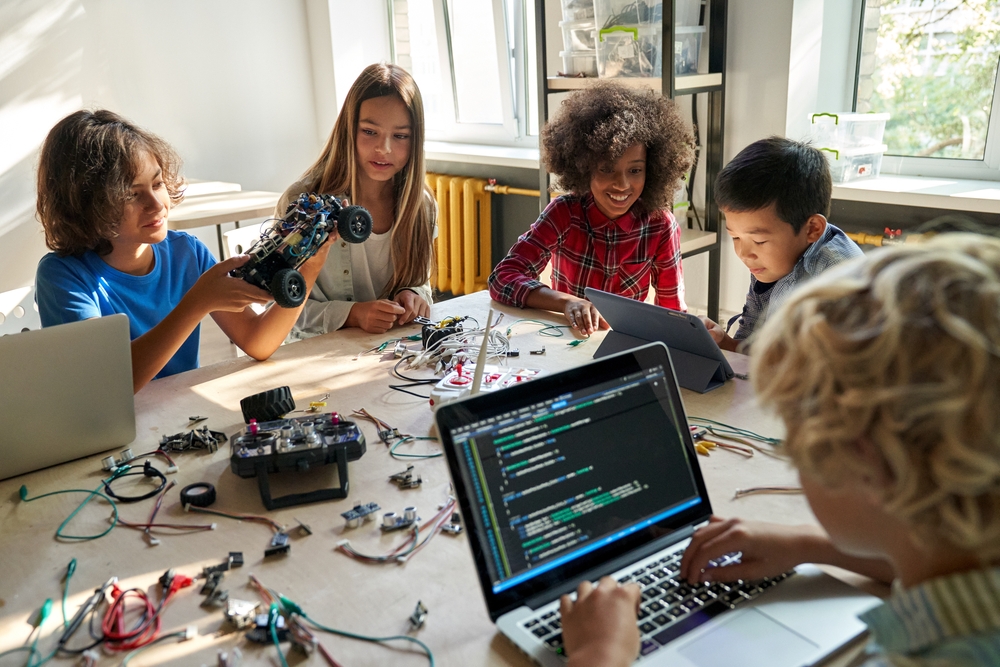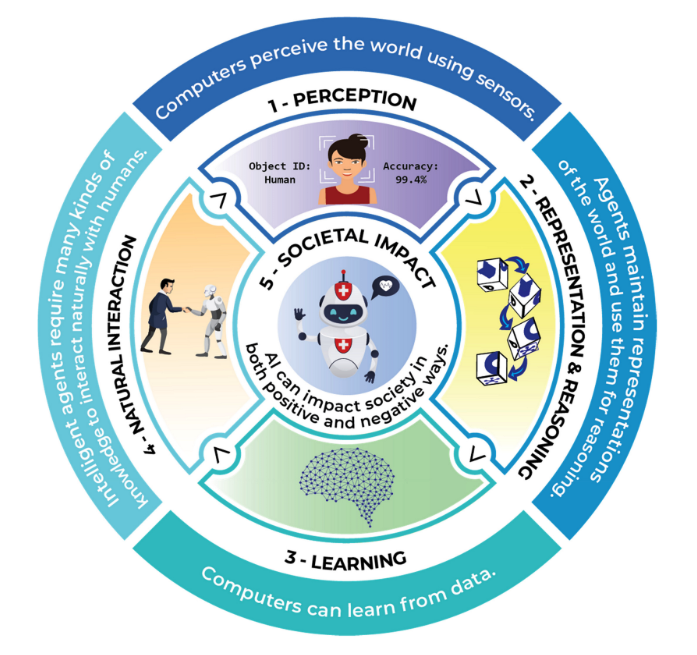
Tech Zone
Technology is Shaping the World, Who's Shaping Technology?
Technology is Shaping the World, Who's Shaping Technology?
The Transformative Impact of Early Exposure to Coding, Robotics, and AI on a Child's Future
Embracing coding, robotics, and AI at an early age has profound and lasting benefits that extend far beyond the classroom. Here are key advantages that shape a child's future:
1. Fostering Critical Thinking:
Early exposure to coding instills fundamental problem-solving skills. Through creating algorithms and solving coding challenges, children develop critical thinking and logical reasoning abilities that are invaluable across various disciplines and real-world scenarios.
2. Building a Foundation for Technology Literacy:
In our increasingly digital world, understanding the language of technology is akin to literacy. Starting early allows children to become fluent in the basics of coding and technology, providing them with the skills needed to navigate and succeed in a technology-driven future.
3. Encouraging Creativity and Innovation:
Coding, robotics, and AI provide a canvas for creativity. As children design their own programs, build robots, or explore AI applications, they cultivate an innovative mindset. These experiences encourage them to think outside the box and become creators rather than mere consumers of technology.
4. Preparing for Emerging Career Opportunities:
The technology landscape is evolving rapidly, and early exposure to coding, robotics, and AI positions children at the forefront of emerging career opportunities. Familiarity with these fields not only opens doors to future tech-related professions but also equips them with adaptable skills for a dynamic job market.
5. Enhancing Collaborative Skills:
Coding and robotics often involve collaborative projects. Working in teams to solve coding challenges or build robots fosters effective communication, teamwork, and collaboration. These social skills are essential not just in the tech industry but in virtually every professional setting.
6. Understanding the Ethical Implications of Technology:
Delving into AI introduces children to ethical considerations surrounding technology. Early discussions about the responsible use of AI technologies pave the way for ethical decision-making, ensuring that future tech leaders approach their work with a thoughtful and socially responsible mindset.
7. Promoting Resilience and Perseverance:
Coding and robotics projects may come with challenges. Facing and overcoming these challenges instills resilience and perseverance. Children learn that overcoming obstacles is an integral part of the learning process, cultivating a growth mindset that extends beyond technology into all aspects of life.
8. Instilling Confidence in Technology Mastery:
Early successes in coding and robotics empower children with a sense of confidence in their technological abilities. This confidence is a catalyst for continued learning, as they approach future technological challenges with a positive attitude and a belief in their capacity to overcome hurdles.
9. Encouraging Lifelong Learning:
Exposure to coding, robotics, and AI nurtures a love for learning. Children develop a natural curiosity about technology and the world around them, laying the foundation for a lifelong pursuit of knowledge and adaptability to new technologies as they emerge.
10. Shaping Future Innovators and Leaders:
Ultimately, introducing children to coding, robotics, and AI early on not only prepares them for the future but empowers them to actively shape it. It's an investment in their intellectual development, providing the tools and mindset necessary to thrive in a technology-driven world.

CODING
Kindergarten to 2nd Grade:
Introduction to Coding Wonderland
Embark on a magical journey into the world of coding designed specifically for our youngest learners (K-2). In this enchanting class, students will explore the basics of coding through engaging activities, interactive games, and animated stories. They will develop fundamental skills such as problem-solving, sequencing, and logic in a playful and imaginative environment. Topics include basic programming concepts, algorithmic thinking, and creative expression through coding.
Graphic Concept:
Imagine a whimsical landscape filled with colorful characters and playful elements. Use cheerful illustrations of friendly robots guiding young learners through a magical coding wonderland. Incorporate vibrant colors, simple icons representing coding blocks, and joyful animations that convey the excitement of discovery.
3rd to 5th Grade:
Coding Explorers Adventure
For our curious and budding tech enthusiasts in 3rd to 5th grade, the Coding Explorers Adventure awaits! This class delves deeper into the world of coding, introducing students to block-based and text-based programming languages. Participants will discover the excitement of creating their own interactive stories, games, and simple applications. The curriculum covers essential coding concepts like loops, conditionals, and variables, fostering a solid foundation for future programming endeavors.
Graphic Concept:
Create an adventurous scene with coding explorers navigating through a digital realm. Illustrate students engaging with block-based and text-based coding languages, surrounded by symbols like loops, variables, and interactive elements. Use dynamic graphics to showcase the progression from basic coding concepts to creative project development.
6th to 8th Grade:
Journey into Advanced Coding Realms
Prepare to embark on a journey into the advanced coding realms tailored for 6th to 8th graders. This class is designed for students ready to tackle more complex coding challenges. Participants will dive into text-based languages, exploring the principles of object-oriented programming, data structures, and algorithm design. The curriculum includes hands-on projects, coding competitions, and collaborative problem-solving. Students will gain a deeper understanding of coding and develop practical skills applicable to real-world scenarios.
Each class is crafted to inspire creativity, critical thinking, and a lifelong passion for coding. Join us as we empower young minds to become the future innovators of the digital age!

Robotics
Robotics Adventure Classes for Every Age Group:
Kindergarten to 2nd Grade:
Title: Robot Explorers Playground
Embark on a journey of wonder and discovery in our Robot Explorers Playground for K-2! This foundational class introduces the youngest learners to the magical world of robotics. Starting with the basics, kids will explore the principles of coding through interactive games and activities. They'll then transition to hands-on experiences with adorable, user-friendly robots. Topics include sequencing commands, basic problem-solving, and understanding simple sensors. This class sets the stage for a seamless transition from coding to the exciting realm of robotics.
3rd to 5th Grade:
Title: Coding Pioneers to Robot Engineers
For our Coding Pioneers in 3rd to 5th grade, the journey continues with a transition from coding mastery to becoming Robot Engineers. Students will build on their coding skills, progressing from block-based to text-based languages. This intermediate robotics class introduces the concept of hardware integration, as participants program more advanced robots. Topics include advanced coding concepts, robot design principles, and collaborative problem-solving. By applying coding knowledge to robotics, students witness the direct connection between code and real-world, tangible machines.
6th to 8th Grade:
Title: Robotics Innovators Lab
Welcome to the Robotics Innovators Lab, designed for 6th to 8th graders ready to take coding to the next level. In this advanced class, students become true innovators as they delve into programming intelligent machines and sophisticated robotic systems. Building on their coding expertise, participants explore the intricacies of algorithms, artificial intelligence, and autonomous decision-making. The class emphasizes a holistic understanding of coding languages, pushing students to engineer robots capable of complex tasks. It's a transformative experience where coding seamlessly intertwines with robotics, preparing students for the tech landscape of tomorrow.
Intertwining Coding and Robotics:
Our Robotics Adventure Classes create a seamless progression from coding to robotics, offering a comprehensive learning experience for every age group:
- Foundation Building: Coding classes lay the groundwork, teaching fundamental principles of problem-solving and logic that directly translate to robotics.
- Hands-On Transition: As students advance, they transition from coding on screens to the tangible world of robots, applying coding concepts to bring machines to life.
- Complex Problem-Solving: The intertwining of coding and robotics encourages students to engage in more complex problem-solving, promoting critical thinking skills.
- Real-World Application: From basic coding blocks to programming intelligent machines, the journey reflects the natural progression of coding skills applied to real-world scenarios.
Ai
AI Explorers Program: Nurturing Young Minds for the Future
Kindergarten to 2nd Grade:
Title: AI Discovery Playhouse
Welcome to the AI Discovery Playhouse for our youngest learners (K-2). In this class, children explore the 5 BIG Ideas of AI in an engaging and age-appropriate manner. Through interactive games and activities, they discover the concepts of Perceptions, Representation and Reasoning, Learning, Natural Interaction, and Societal Impact. The focus is on building a foundational understanding of how machines perceive, learn, and interact, setting the stage for a lifelong curiosity about Artificial Intelligence.
3rd to 5th Grade:
Title: Coding, Robotics, AI: The Power Trio
For 3rd to 5th graders, our program builds on the power trio of Coding, Robotics, and AI while delving into the 5 BIG Ideas. Students progress from understanding how code and robots function to exploring the principles of AI. They grasp the significance of AI in Perceptions (sensors and data), Representation and Reasoning (algorithmic thinking), Learning (machine learning basics), Natural Interaction (human-robot interaction), and Societal Impact (ethical considerations). It's a holistic journey through the interconnected realms.
6th to 8th Grade:
Title: AI Innovators Lab
In the AI Innovators Lab for 6th to 8th graders, students dive deep into the 5 BIG Ideas, advancing their knowledge and application. They explore the intricacies of Perceptions through computer vision, Representation and Reasoning with advanced algorithms, Learning through neural networks, Natural Interaction in sophisticated AI interfaces, and Societal Impact by addressing ethical challenges. This advanced class prepares them to be ethical AI innovators, considering the societal implications of their creations.
Intertwining Coding, Robotics, and AI:
Our AI Explorers Program seamlessly weaves together the realms of Coding, Robotics, and AI, aligning with the 5 BIG Ideas to create a comprehensive and progressive learning experience:
- Foundation Laying: Coding establishes the groundwork for the 5 BIG Ideas by introducing logical thinking. Robotics extends this by applying code to tangible machines, exploring the Ideas in Perceptions and Natural Interaction. AI completes the trio, delving into all 5 BIG Ideas, fostering a holistic understanding of technology.
- Progressive Skills: As students progress, they naturally build upon their understanding of the 5 BIG Ideas. From basic concepts in coding to complex applications in AI, they learn how machines perceive, reason, learn, interact, and impact society.
- Innovative Applications: The trio empowers students to create innovative solutions aligning with the 5 BIG Ideas. For instance, programming a robot to utilize AI for autonomous decision-making aligns with Perceptions, Learning, and Natural Interaction.
- Real-World Impact: By considering the 5 BIG Ideas, students are prepared for a future where their skills contribute to the ethical development and implementation of AI technologies. The program fosters a holistic approach, ensuring they understand not just the technicalities but also the societal implications.

